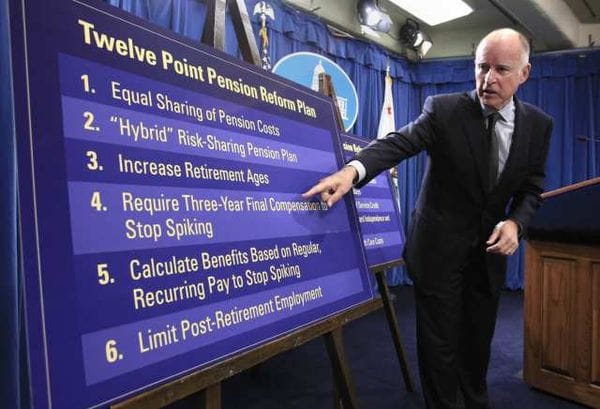Politicians and Unions Hide Liabilities for Public Pensions


Public pensions across the country generally calculate future liability by assuming an 8% rate of return. "The problem with that is the 8 percent assumption is totally bogus," says Connecticut columnist George Gombossy, noting that that public pension returns there have averaged just 5.7% for the past ten years. Most other states have similar problems with overly rosy projections that do not track reality. When that happens, pension funds have funding shortfalls. Assuming 8% but getting 5.7% means you will be 20% short at the end of ten years.
Further, an 8% return year after year is difficult to do even when the economy is booming. To expect such a return when interest rates are at record lows, the stock market is wobbly, and the country is in recession is delusion or deliberate evasion. This is known as “pretend-and-extend". Pretend everything is okay by papering over or ignoring financial problems then extend them into the future with accounting tricks in hopes that someone other than you will eventually be forced to deal with the problems.
Some public pension funds, including California giant CalPERS, have cut their assumed rate of return to 7.5%. New York City is considering doing the same. This triggered mocking and caustic comments from New York City Mayor Michael Bloomberg who said:
"The actuary is supposedly going to lower the assumed reinvestment rate from an absolutely hysterical, laughable 8 percent to a totally indefensible 7 or 7.5 percent. If I can give you one piece of financial advice: If somebody offers you a guaranteed 7 percent on your money for the rest of your life, you take it and just make sure the guy’s name is not Madoff."
Ouch. Complicating matters even further, retirees are living longer than previously which means pensions must put aside more money for benefits and health care. The New York City actuary suggests spreading out such costs for twenty two years. But this is just more pretend-and-extend. A further problem is that public pensions are allowed to use more permissive accounting rules for pensions that private pensions, who use an average 4.8% return to calculate costs.
Public unions, quite naturally, oppose changes in pension calculations as they fear it could lead to the entire agreements being renegotiated. They also fear, not unreasonably, that such negotiations could be a pretext for union busting.
The new CalPERS 7.5% assumed rate of return has a 50-50 chance of reaching that goal over the next twenty years says their actuary. A member of the board responded:
"To me, as a fiduciary, you want to have more than a 50 percent chance of success.”If CalPERS kept setting high targets and missing them, "the impact on the counties won’t be bigger numbers,” he said. “It will be bankruptcy."


